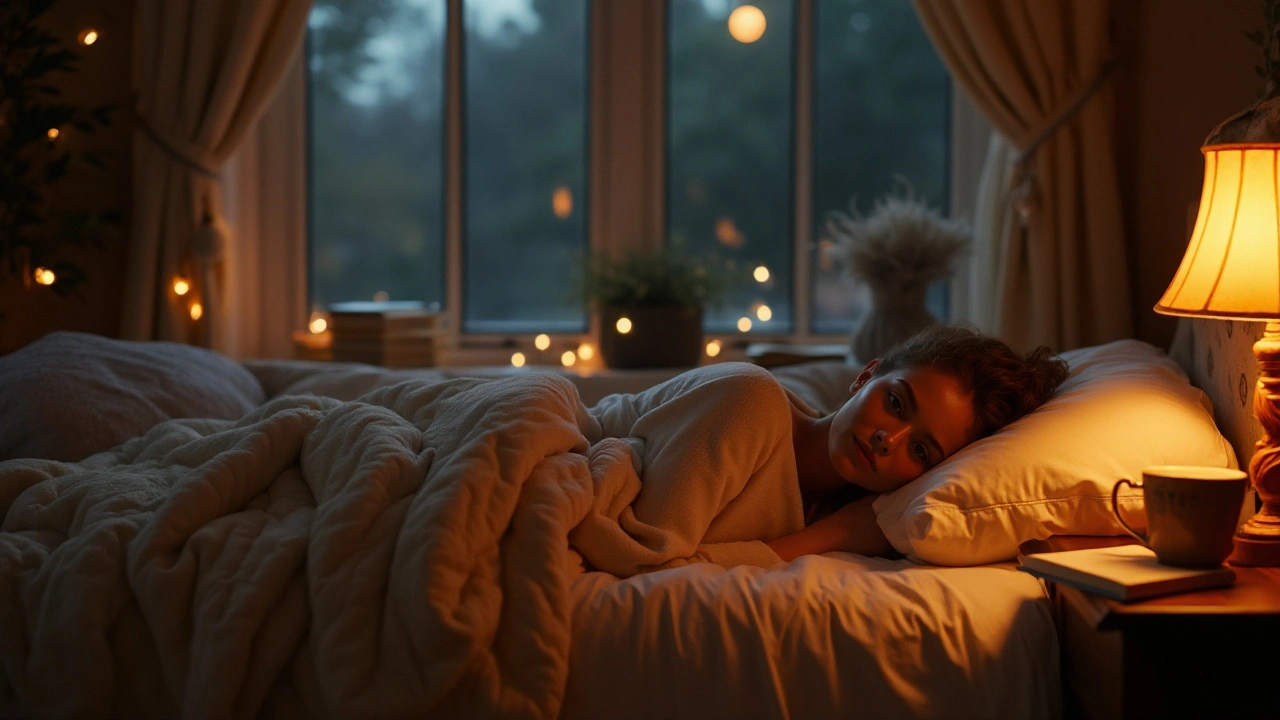Every so often, the gentle embrace of a good night's sleep feels like the warmest of hugs, but what happens when that embrace becomes elusive? For countless people, sleep and mental health are intricately linked, particularly when talking about depressive disorder.
Understanding this connection is vital since sleep difficulties can exacerbate depression and vice versa. The dance between insomnia and mood swings is well-documented, and while the terms may sound clinical, they're part of daily life for many. We often underestimate how important sleep is for emotional harmony and wellness.
In this exploration, let's delve into how and why sleep affects depression and identify some ways to foster better sleep habits. It's a stepping stone towards improving mental health, and perhaps, in breaking away from the cycle of restlessness and sadness.
- The Science Behind Sleep and Mood
- Impact of Insomnia on Depression
- How Sleep Deprivation Affects the Brain
- Sleep's Role in Stress and Anxiety
- Tips to Improve Sleep for Better Mental Health
- Therapeutic Approaches Addressing Both Sleep and Depression
The Science Behind Sleep and Mood
The intricate relationship between sleep and mood has fascinated researchers and mental health professionals for decades. When we drift into slumber, our brains embark on a journey, cycling through different stages, from the light, restful waves of REM sleep to the deep, restorative processes of non-REM sleep. Each stage plays a distinctive role in maintaining mental health, and disruptions can have far-reaching consequences. According to studies, individuals with sleep disorders are more likely to develop emotional disturbances.
Our brain's architecture is like a majestic orchestra, with each part contributing to the melody of a good night's rest. During sleep, the amygdala, a region associated with emotions and fear responses, rejuvenates and stabilizes. When depression takes the reins, the amygdala becomes hypersensitive, often due to inadequate sleep, leading to exaggerated mood swings and emotions. A syncopated sleep pattern could lead to an heightened production of stress hormones, fueling a vicious cycle that influences mood disorders.
Scientists have found that the disruption of circadian rhythms plays a pivotal role in this intricate dance. Circadian rhythms, our body's internal clock, have a profound influence on hormonal levels, alertness, and emotions. When they're thrown off balance, so too is our mental state. Sleep disturbances can lead to a reduction in serotonin levels, a neurotransmitter that contributes positively to mood stabilization. Interestingly, reduced serotonin levels have been linked with both insomnia and depression.
Research shows that REM sleep, typically associated with vivid dreams, is particularly important for mood regulation. Sleep studies have revealed that prolonged REM disruption or deprivation often results in increased irritability and stress. According to the American Psychological Association, maintaining a healthy sleep architecture is not just about length, but the quality and continuity of sleep each night, as these factors contribute to emotional resilience.
"Sleep is the best meditation," remarked the Dalai Lama. This ancient wisdom resonates deeply in today’s world, emphasizing the power of restful sleep in achieving inner peace and emotional stability.
The implications of these findings are profound. Sleep isn’t merely a passive state but an active process integral to our mental health. Sleep should be treated as a vital component of an individual's daily routine rather than an afterthought. When addressing mood disorders, it’s not only vital to tackle the symptoms but also to resolve underlying sleep issues. Embracing this holistic view can significantly improve outcomes for those struggling with mental health challenges.
Impact of Insomnia on Depression
The intricate relationship between insomnia and depression is much like a puzzling symphony, where either can play the lead role at different times. When insomnia strikes, it’s not merely about the loss of sleep but rather a more complex cycle involving both mental and physical health. Sleep deprivation can often lead to the onset or intensification of depressive symptoms. The lack of restorative sleep undermines emotional resilience, making it harder for individuals to cope with life's stressors.
Studies have intriguingly shown that those enduring persistent insomnia are at an elevated risk of developing depression. A survey from the National Sleep Foundation indicated that people suffering from insomnia are ten times more likely to experience clinical depression. This connection stems from how insufficient sleep affects emotional processes. Sleep deprivation influences the brain’s capacity to regulate emotions, often tipping the balance towards negative affectivity. It’s akin to being stuck on a roller coaster with no option of getting off.
The resultant irritability and mood swings that accompany insomnia can further compound feelings of hopelessness. The brain’s cognitive function takes a hit as well, leading to increased difficulty in concentrating and retaining memories. Such cognitive impairments contribute significantly to the depressive symptomatology. Dr. Michael Perlis at the University of Pennsylvania eloquently states,
“Insomnia is an independent risk factor for the development of depression and can increase your chances of having depressive episodes by more than two-fold.”
Effects on Lifestyle and Coping Mechanisms
The impact of insomnia goes beyond emotional instability, affecting various aspects of an individual’s life, including professional performance and social interactions. It leads to a decline in work productivity and can strain relationships, causing a feedback loop of stress and anxiety that perpetuates the insomnia. The lack of energy can discourage individuals from engaging in activities they once found pleasurable, a classic sign of anhedonia, often seen in depressive disorder. This further reinforces feelings of isolation and sadness.
Individuals suffering from both insomnia and depression frequently find it challenging to break the cycle on their own. The exhaustion from sleepless nights can sap the motivation needed to seek help or adopt healthier sleep habits. Progressive cognitive behavioral therapy (CBT) approaches have shown promising results in addressing both issues simultaneously. In fact, research indicates that when insomnia is treated effectively, it can lead to a 50% reduction in depression severity.

How Sleep Deprivation Affects the Brain
Sleep is one of those fundamental necessities in life that we often take for granted until it's disrupted. Much like a reset button, a good night's rest helps the brain process information, solidifies memories, and prepares us for the next day. When deprived of this critical function, the consequences for the brain can be profound and far-reaching. Sleep deprivation is known to impair cognitive functions including attention, alertness, and reasoning, which are crucial for both daily tasks and long-term goals.
Studies have shown that a lack of sleep affects the brain's ability to perform executive functions, including decision-making, problem-solving, and controlling emotions. The prefrontal cortex, where these functions are managed, is significantly impacted. In this sleep-deprived state, individuals often find themselves more irritable, with moods fluctuating unpredictably. It's no wonder that untreated sleep issues can often lead to or exacerbate mental health conditions such as depression. The relationship between sleep and depression is particularly noteworthy; a study published in the journal Biological Psychiatry found that sleep deprivation can lead to a decrease in energy levels and attention span, both of which are symptomatic of mental health disorders.
The ripple effect continues with the brain's reward system. A lack of sleep can alter the brain's production of dopamine, the neurotransmitter responsible for motivation and feelings of pleasure. This alteration can skew perceptions of rewards, making everyday tasks feel less satisfying and contributing to the feelings of apathy often seen in depressive states. For some, chronic sleep deprivation may also result in hallucinations and delusion, extreme reactions that underline the seriousness of ongoing unrest.
"Sleep deprivation is an acute advantage for elucidating brain physiological responses, making it a pivotal study model," said Dr. Jessica Payne, a psychology professor at the University of Notre Dame.
The relationship between sleep and the brain extends to other areas as well. The body's natural circadian rhythm plays a key role in sleep regulation, and its disruption can affect sleep-wake cycles, impacting overall brain health. This might explain why shift workers or individuals experiencing jet lag exhibit impaired cognitive performance and mood changes. Chronic sleep deprivation hampers the brain's ability to eliminate toxins, which are accumulated during the day, further influencing the potential for developing neurodegenerative disorders like Alzheimer's.
Individuals can take proactive steps to combat sleep deprivation and its effects on the brain. Developing a consistent sleep schedule, minimizing screen time before bed, and creating a restful sleeping environment are some measures that can aid in achieving restful sleep. It's essential to prioritize sleep health, recognizing it as a cornerstone of mental wellness and brain function. By understanding and addressing the intricate links between sleep and brain health, one can take meaningful strides towards overall well-being and resilience against potential mental health challenges.
Sleep's Role in Stress and Anxiety
In today’s fast-paced world, stress and anxiety are virtually unavoidable, creeping into our daily lives, often when least expected. Yet, beneath the surface, a fundamental question remains—how entwined are stress, anxiety, and our sleeping habits? Research consistently reveals that a lack of proper rest significantly affects our capacity to manage stress and anxiety. Sleep deprivation doesn’t just leave us feeling bleary-eyed, it affects our emotional regulation, making individuals more susceptible to feeling overwhelmed. A poorly rested brain can overreact to minor stressors, escalating them into significant sources of anxiety. A study in the journal “Sleep” noted that individuals experiencing insomnia are more likely to develop anxiety disorders. Essentially, sleep helps regulate our stress hormone levels, such as cortisol, and allows us to reset emotionally. Without it, a domino effect of irritability and increased anxiety can take hold.
Examining the relationship between sleep and anxiety further, one finds that during sleep, our bodies undergo a natural process of healing and rejuvenation. When deprived of this critical restoration period, our physiological stress responses are heightened. Imagine your body’s stress response as a garden hose left unchecked—without adequate sleep, the stress flow is relentless, wearing out your mental defenses. The American Psychological Association emphasizes that approximately 60% of adults report increased stress when they do not achieve enough sleep. This indicates a fundamental biological need—a restorative sleep—without which stress levels may spiral uncontrollably. A simple shift in one’s sleep routine toward more consistent and adequate rest can be a powerful antidote to everyday stress.
The narrative goes beyond just emotion; cognitive performance is also heavily influenced by how well one sleeps. Lack of sleep can cloud judgment, impair decision-making, and diminish memory function. Dr. Matthew Walker, a renowned neuroscientist specializing in sleep, once said,
"Sleep is the Swiss Army knife of health. When sleep is deficient, there is sickness and disease. And when it is abundant, there is vitality and health."Like tools in that Swiss Army knife, each form of cognitive function relies on the foundation of sleep to navigate the complex landscape of daily life. When we're sleep-deprived, our coping skills diminish, leaving us vulnerable to anxiety and stress.
For those looking to subdue stress and bolster emotional resilience, enhancing sleeping habits is one of the most proactive approaches. It's not only about quantity but quality. Establishing a calming bedtime routine—perhaps by dimming the lights, shutting down screens, or engaging in mindfulness practices—can improve sleep quality. As these habits take root, individuals frequently observe a decrease in their stress levels and enhanced anxiety management. The link between these elements is clear: better sleep can become a sanctuary from the tumult of anxiety, providing a crucial defense shield against the mental strains of modern life.

Tips to Improve Sleep for Better Mental Health
In the busy whirlwind of life, prioritizing sleep can feel like another daunting task on your endless to-do list. Yet, the benefits that come from solid slumber are invaluable, especially when battling the dual storm of depression and sleep troubles. Establishing a consistent bedtime routine is crucial, helping train your brain to associate certain activities with winding down. Imagine your room as a peaceful sanctuary. Darkness is your ally; blackout curtains can work wonders by blocking out disruptive light. Keep it cool, ideally between 60-67 degrees Fahrenheit, allowing your body temperature to drop naturally as you drift into slumber.
An often overlooked aspect of sleep health is diet. What you consume in the hours before bed can have a significant impact on your ability to fall and stay asleep. Avoid large meals, caffeine, and nicotine close to bedtime. These can linger in your body, leading to jittery nerves and wakefulness. Instead, opt for a light snack if you're hungry—something small and easy to digest. Whole grains, bananas, or a glass of warm milk may help the process. Hydration is also important, but try to limit liquids in the evening to prevent disruptive middle-of-the-night bathroom trips.
Stress management is another key variable in the sleep equation. Many people find that meditative practices can help quell racing thoughts and promote relaxation. Techniques such as deep breathing exercises or gentle yoga before bed can work miracles by removing the day's tension from your muscles and mind. You might also try journaling to externalize any nagging thoughts, giving you a chance to clear your head and approach the night with a clean mental slate.
In our technology-driven world, screens are a common sleep robber. The blue light emitted by phones, tablets, and computers tricks your brain into thinking it should stay alert. Implement a tech curfew, turning off devices at least an hour before bedtime. Instead, engage in calming activities like reading a book or listening to soothing music. This simple practice can signal to your brain that it's time to wind down, encouraging a natural sleep cycle.
Sometimes the struggle with sleep is more than lifestyle changes can handle, so it's crucial to recognize when to seek professional help. Sleep disorders, such as insomnia, may require interventions that only a trained specialist can provide. Turning to experts for guidance can lead to personalized strategies tailored to your specific needs. Cognitive-behavioral therapy for insomnia (CBT-I) has proven effective for many, helping to reshape unhealthy sleep patterns and thoughts.
Let's take a moment to reflect on the words of Dr. Matthew Walker, a renowned sleep scientist:
"The best bridge between despair and hope is a good night's sleep."This powerful reminder captures the essence of why nurturing your sleep is vital, not just for mental health but for fostering a life full of energy and potential. As you explore these strategies, remain patient and attentive to your body's responses. With dedication and care, you may find sleep becomes a new friend, supporting a balanced and joyful life.
Therapeutic Approaches Addressing Both Sleep and Depression
Tackling the intertwined issues of sleep disturbances and depression requires a holistic approach that considers both physical and emotional facets of well-being. A primary emphasis has been on Cognitive Behavioral Therapy for Insomnia (CBT-I), which is designed to improve sleep quality by helping individuals understand and change the thoughts and behaviors that influence their sleep. With a focus firmly on altering the sleep habits and misconceptions about sleep, CBT-I has shown remarkable effectiveness in not only enhancing sleep patterns but also in alleviating depressive symptoms.
The relationship between mental health and rest goes beyond just therapy; it includes a strategic combination of lifestyle adjustments. Regular physical activity, even something as simple as a daily walk, can boost mood and promote better sleep. Exercising releases endorphins, which naturally improve mood, while also regulating sleep patterns by tiring the body physically, thus promoting a restful night.
Medication can be another part of the treatment strategy, though it is often considered when other methods do not suffice. Antidepressants are commonly prescribed, and for those with depression-related insomnia, a low-dose sedative may be considered under careful supervision. It's important, however, to consider these options as a temporary fix while establishing more sustainable habits and routines.
In some cases, incorporating mindfulness practices such as yoga and meditation can significantly bolster both sleep and mood. These practices help reduce stress, and controlled breathing helps in decreasing anxiety, creating a path to mental tranquility. Studies have shown that mindfulness-based therapies can be as effective as medication in treating mild depression, proving that rest for the mind and body is crucial.
"We need to pay attention to the small cues our bodies give us about fatigue and mental strain—because they are often interconnected," stated Dr. Elizabeth Benton from the National Institute of Mental Health.
Moreover, the establishment of a consistent bedtime routine is crucial in facilitating sleep quality. This involves creating a comfortable bedtime environment, which can include dimming lights or engaging in relaxing activities like reading or taking a bath before bed. The body thrives on routine, and keeping a regular sleep schedule helps regulate the internal body clock, which can lead to a more restful night and improved mental health.
Notably, dietary adjustments can also play a vital role. Avoiding large meals and stimulants like caffeine before bed helps reduce sleep disruptions. Instead, opting for light meals and herbal teas known for their calming effects could support a smoother transition to sleep. Equally, seeking professional counseling to address underlying psychological issues provides a safe space to explore patterns of thought contributing to depression and sleep disturbances.






Hope NewYork
lol who even cares about sleep? just take melatonin and call it a day. everyone's so dramatic about 'emotional harmony' like it's some mystical ritual. i've been up for 72 hours and still function better than you with your 8 hours of 'restorative' nonsense.
Bonnie Sanders Bartlett
I've seen people turn their lives around just by going to bed at the same time every night. No magic, no pills. Just consistency. It's not about perfection-it's about showing up for yourself, even when it's hard. Small steps matter more than you think.
Melissa Delong
Sleep is a government-controlled distraction. The real issue is the pharmaceutical-industrial complex pushing sleep aids to keep you docile. They don't want you to wake up and realize your depression is caused by the algorithmic manipulation of your circadian rhythm through LED lighting and smartphone notifications. Wake up.
Marshall Washick
I used to think sleep was just downtime. Then I started tracking my moods and realized how much worse I felt after even one night of poor rest. It's not just about feeling tired-it's like your brain forgets how to be gentle with itself. I don't talk about it much, but that quiet shift in how I feel after a good night? That's the only real medicine I've found.
Abha Nakra
In India, we call this 'chinta ka dard'-the pain of worry. Many don't have the luxury of fancy sleep routines, but what works is routine itself. Eat at the same time, turn off lights when the sun sets, avoid screens after dinner. Simple. Not perfect, but real. And yes, it helps. I've seen it in my family for decades.
Neal Burton
The entire premise of this article is bourgeois nonsense. Sleep is a capitalist construct designed to maximize productivity. True mental liberation comes from rejecting societal sleep norms and embracing the existential void of insomnia. The real depression isn't the lack of REM-it's the illusion that you can be 'fixed' by a bedtime routine. I've read Nietzsche and still can't sleep. Coincidence? I think not.
Tamara Kayali Browne
The data presented here is statistically insignificant and methodologically flawed. Correlation does not imply causation. You cite the National Sleep Foundation without acknowledging their funding sources. The APA's claims on sleep and depression are based on self-reported surveys with high attrition bias. Until peer-reviewed longitudinal studies control for socioeconomic variables, this is just anecdotal pseudoscience dressed as clinical insight.
Nishigandha Kanurkar
The government is using 5G towers to disrupt our sleep cycles!!! They're feeding us fake serotonin through the WiFi!!! I've measured the EMF spikes in my bedroom-every time I dream, the numbers spike!!! I'm not crazy, I've got the graphs!!! They're watching us through our smart fridges!!!
Lori Johnson
I used to think I was just lazy. Turns out I had undiagnosed sleep apnea. My husband noticed I stopped breathing for 15 seconds every 3 minutes. We got a CPAP. Changed everything. No magic, no pills. Just a mask and a machine. If you're tired all the time, get tested. Seriously. It's not 'just stress'.
Tatiana Mathis
I’ve spent years helping people rebuild their sleep after trauma, burnout, or grief-and what I’ve learned is that sleep isn’t a habit you fix, it’s a relationship you rebuild. You don’t force it. You invite it. You create space for stillness, even if it’s just five minutes of quiet before bed. You stop punishing yourself for not being ‘productive’ at night. You stop thinking sleep is a reward for a good day. It’s not. It’s the foundation. And if you’ve been neglecting it, it’s okay to start again. Slowly. Gently. One breath at a time.
Michelle Lyons
I don't believe in sleep. I think it's a cover for what's really going on-alien mind control via subliminal frequencies embedded in white noise apps and ASMR videos. I've analyzed the audio spectrum of every lullaby on YouTube. They're all tuned to 432Hz. That's not a coincidence. That's a signal. I've stopped using my phone at night. I sleep in a Faraday cage lined with aluminum foil. I'm the only one who knows the truth.